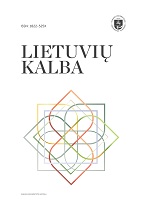LIETUVIŲ KALBOS ŽARGONO PAVIENIAI SUPRIEVEIKSMĖJĘ ŽODŽIAI IR PRIEVEIKSMIAI BE FORMANTŲ BEI JŲ ADAPTACINĖS YPATYBĖS
ADVERBIALIZED INDIVIDUAL WORDS AND ADVERBS WITHOUT SUFFIXES IN LITHUANIAN SLANG AND NON-NORMATIVE LANGUAGE AND THEIR ADAPTATIVE FEATURES
Author(s): Robertas KudirkaSubject(s): Phonetics / Phonology, Lexis, Baltic Languages
Published by: Vilniaus Universiteto Leidykla
Keywords: Lithuanian language; slang; normative language; adverbialized individual words; adverbs;
Summary/Abstract: Here are a number of adverbialized individual words and adverbs without suffixes in Lithuanian slang and non-normative language. Most of them are assimilated borrowings adapted to the language system. Adaptive adverbialization of borrowed adverbs is determined by certain systemic features which are related to the territorial dialects of the Lithuanian language and the standard language. When the Slavic formants of the borrowed individual words are phonetically adapted, analogous hybrid derivatives with that formant are already available in Lithuanian slang. There are few adverbs derived from the singular nominative case. There are also few adverbs derived from the conjugation forms of the verb, mostly the forms are borrowed from informal Russian language. There are a number of borrowed adverbs without formants: there are mostly phonetically, graphically adapted borrowings from Russian language; borrowings of this type are rare from English and German languages. The analysis found that the adaptive features of the slang adverbs are determined by systemic regularities. Slang adverbs are adapted phonetically and graphically according to the principle of substitution of foreign phonemes as close as possible to their own. Slang lexicon tends to copy standart language models and integrate into Lithuanian language derivative and flexic paradigms.
Journal: Lietuvių kalba
- Issue Year: 2020
- Issue No: 14
- Page Range: 1-16
- Page Count: 16
- Language: Lithuanian

